 Полная версия
Полная версияComic History of the United States
The Wilmot Proviso was invented by David Wilmot, a poor, struggling member of Congress, who moved that in any territory acquired by the United States slavery should be prohibited except upon the advice of a physician. The motion was lost.
Gold was discovered in the Sacramento Valley in August, 1848, by a workman who was building a mill-race. A struggle ensued over this ground as to who should own the race. It threatened to terminate in a race war, but was settled amicably.
In eighteen months one hundred thousand people went to the scene. Thousands left their skeletons with the red brother, and other thousands left theirs on the Isthmus of Panama or on the cruel desert. Many married men went who had been looking a long time for some good place to go to. Leaving their wives with ill-concealed relief, they started away through a country filled with death, to reach a country they knew not of. Some died en route, others were hanged, and still others became the heads of new families. Some came back and carried water for their wives to wash clothing for their neighbors.
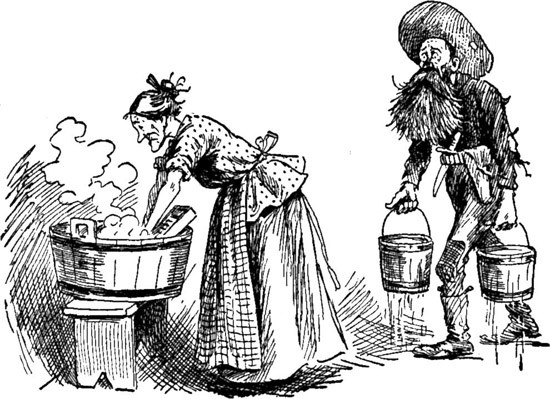
SOME CAME BACK AND CARRIED WATER FOR THEIR WIVES TO WASH CLOTHING.
It was a long hard trip then across the plains. One of the author's friends at the age of thirteen years drove a little band of cows from the State of Indiana to Sacramento. He says he would not do it again for anything. He is now a man, and owns a large prune-orchard in California, and people tell him he is getting too stout, and that he ought to exercise more, and that he ought to walk every day several miles; but he shakes his head, and says, "No, I will not walk any to-day, and possibly not to-morrow or the day following. Do not come to me and refer to taking a walk: I have tried that. Possibly you take me for a dromedary; but you are wrong. I am a fat man, and may die suddenly some day while lacing up my shoes, but when I go anywhere I ride."
When he got to Sacramento, where gold was said to be so plentiful, he was glad to wash dishes for his board, and he went and hired himself out to a citizen of that country, and he sent him into the fields for to feed swine, and he would fain have filled his system with the California peaches which the swine did eat, and he began to be in want, and no man gave unto him, and if he had spent his substance in riotous living, he said, it would have been different.
About thirty years after that he arose and went unto his father, and carried his dinner with him, also a government bond and a new suit of raiment for the old gentleman.
I do not know what we should learn from this.
CHAPTER XXIII.
THE WEBSTERS
Daniel Webster, together with Mr. Clay, had much to do with the Compromise measures of 1850. These consisted in the admission of California as a free State, the organizing of the Territories of Utah and New Mexico without any provision regarding slavery pro or con, the payment to Texas of one hundred million dollars for New Mexico,—which was a good trade for Texas,—the prohibition of the slave-trade in the District of Columbia, and the enactment of a Fugitive Slave Law permitting owners of slaves to follow them into the free States and take them back in irons, if necessary. The officials and farmers of the free States were also expected to turn out, call the dog, leave their work, and help catch these chattels and carry them to the south-bound train.
Daniel Webster was born in 1782, and Noah in 1758. Daniel was educated at Dartmouth College, where he was admitted in 1797. He taught school winters and studied summers, as many other great men have done since, until he knew about everything that anybody could. What Dan did not know, Noah did.
Strange to say, Daniel was frightened to death when first called upon to speak a piece. He says he committed dozens of pieces to memory and recited them to the woods and crags and cows and stone abutments of the New England farms, but could not stand up before a school and utter a word.
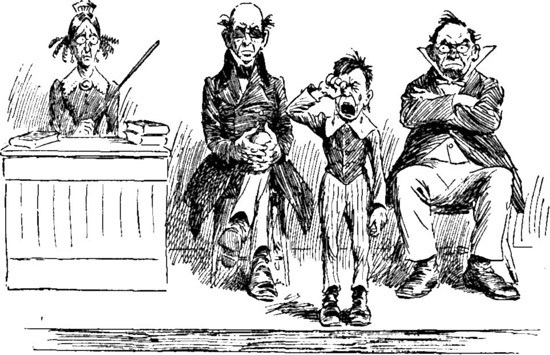
DANIEL WEBSTER COULD NOT STAND UP BEFORE A SCHOOL AND UTTER A WORD.
In 1801 he studied law with Thomas W. Thompson, afterwards United States Senator. He read then for the first time that "Law is a rule of action prescribing what is right and prohibiting what is wrong."
In 1812 he was elected to Congress, and in 1813 made his maiden speech. One of his most masterly speeches was made on economical and financial subjects; and yet in order to get his blue broadcloth coat with brass buttons from the tailor-shop to wear while making the speech, he had to borrow twenty-five dollars.
When the country has wanted a man to talk well on these subjects it has generally been compelled to advance money to him before he could make a speech. Sometimes he has to be taken from the pawn-shop. Webster, it is said, was the most successful lawyer, after he returned to Boston, that the State of Massachusetts has ever known; and yet his mail was full of notices from banks down East, announcing that he had overdrawn his account.
Once he was hard pressed for means, as he was trying to run a farm, and running a farm costs money: so he went to a bank to borrow. He hated to do it, because he had no special inducements to offer a bank or to make it hilariously loan him money.
"How much did you think you would need, Mr. Webster?" asked the President, cutting off some coupons as he spoke and making paper dolls of them.
"Well, I could get along very well," said Webster, in that deep, resinous voice of his, "if I could have two thousand dollars."
"Well, you remember," said the banker, "do you not, that you have two thousand dollars here, that you deposited five years ago, after you had dined with the Governor of North Carolina?"
"No, I had forgotten about that," said Webster. "Give me a blank check without unnecessary delay."
We may learn from this that Mr. Webster was not a careful man in the matter of detail.
His speech on the two-hundredth anniversary of the landing of the Pilgrims was a good thing, and found its way into the press of the time. His speech at the laying of the corner-stone of the Bunker Hill Monument, and his eulogy of Adams and Jefferson, were beautiful and thrilling.
Daniel Webster had a very large brain, and used to loan his hat to brother Senators now and then when their heads were paining them, provided he did not want it himself.
His reply to Robert Y. Hayne, of South Carolina, in 1830, was regarded as one of his ablest parliamentary efforts. Hayne attacked New England, and first advanced the doctrine of nullification, which was even more dangerous than secession,—Jefferson Davis in 1860 denying that he had ever advocated or favored such a doctrine.
Webster spoke extempore, and people sent out for their lunch rather than go away in the midst of his remarks.
Webster married twice, but did not let that make any difference with his duty to his country.
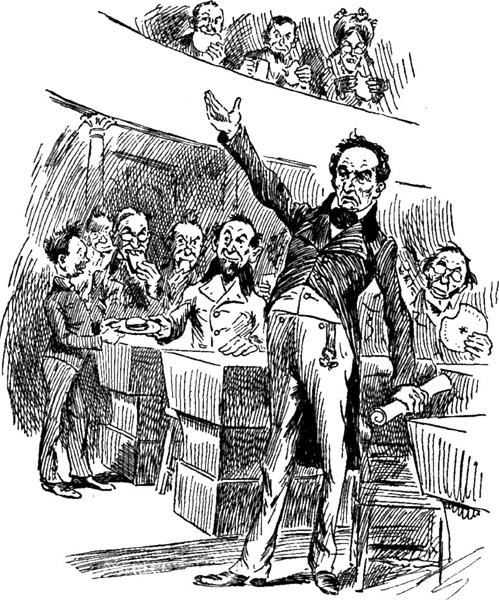
SENT OUT FOR THEIR LUNCH RATHER THAN GO AWAY IN THE MIDST OF HIS REMARKS.
He tried to farm it some, but did not amass a large sum, owing to his heavy losses in trying year after year to grow Saratoga potatoes for the Boston market.
No American, foreign or domestic, ever made a greater name for himself than Daniel Webster, but he was not so good a penman as Noah; Noah was the better pen-writer.
Noah Webster also had the better command of language of the two. Those who have read his great work entitled "Webster's Elementary Spelling-Book, or, How One Word Led to Another," will agree with me that he was smart. Noah never lacked for a word by which to express himself. He was a brainy man and a good speller.
One by one our eminent men are passing away. Mr. Webster has passed away; Napoleon Bonaparte is no more; and Dr. Mary Walker is fading away. This has been a severe winter on Red Shirt; and I have to guard against the night air a good deal myself.
It would ill become me, at this late date, to criticise Mr. Webster's work, a work that is now, I may say, in nearly every home and school-room in the land. It is a great book. I only hope that had Mr. Webster lived he would have been equally fair in his criticism of my books.
I hate to compare my books with Mr. Webster's, because it looks egotistical in me; but, although Noah's book is larger than mine, and has more literary attractions as a book to set a child on at the table, it does not hold the interest of the reader all the way through.
He has introduced too many characters into his book at the expense of the plot. It is a good book to pick up and while away a leisure hour, perhaps, but it is not a work that could rivet your interest till midnight, while the fire went out and the thermometer stepped down to 47° below zero. You do not hurry through the pages to see whether Reginald married the girl or not. Mr. Webster did not seem to care how the affair turned out.
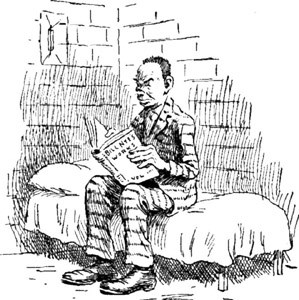
NEVER LEFT HIS ROOM TILL HE HAD DEVOURED IT.
Therein consists the great difference between Noah and myself. He doesn't keep up the interest. A friend of mine at Sing Sing, who secured one of my books, said he never left his room till he had devoured it. He said he seemed chained to the spot; and if you can't believe a convict who is entirely out of politics, whom, in the name of George Washington, can you trust?
Mr. Webster was certainly a most brilliant writer, though a little inclined, perhaps, to be wordy. I have discovered in some of his later books one hundred and eighteen thousand words no two of which are alike. This shows great fluency and versatility, it is true, but we need something else. The reader waits in vain to be thrilled by the author's wonderful word-painting. There is not a thrill in the whole tome.
I had heard so much of Mr. Webster that when I read his book I confess I was disappointed. It is cold, methodical, dry, and dispassionate in the extreme, and one cannot help comparing it with the works of James Fenimore Cooper and Horace.
As I said, however, it is a good book to pick up for the purpose of whiling away an idle hour. No one should travel without Mr. Webster's tale. Those who examine this tale will readily see why there were no flies on the author. He kept them off with this tale.
It is a good book, as I say, to take up for a moment, or to read on the train, or to hold the door open on a hot day. I would never take a long railroad ride without it, eyether. I would as soon forget my bottle of cough-medicine.
Mr. Webster's Speller had an immense sale. Ten years ago he had sold forty million copies. And yet it had this same defect. It was cold, dull, disconnected, and verbose. There was only one good thing in the book, and that was a little literary gem regarding a boy who broke in and stole the apples of a total stranger. The story was so good that I have often wondered whom Mr. Webster got to write it for him.
The old man, it seems, at first told the boy that he had better come down, as there was a draught in the tree; but the young sass-box—apple-sass-box, I presume—told him to avaunt.
At last the old man said, "Come down, honey. I am afraid the limb will break if you don't." Then, as the boy still remained, he told him that those were not eating-apples, that they were just common cooking-apples, and that there were worms in them. But the boy said he didn't mind a little thing like that. So then the old gentleman got irritated, and called the dog, and threw turf at the boy, and at last saluted him with pieces of turf and decayed cabbages; and after the lad had gone away the old man pried the bull-dog's jaws open and found a mouthful of pantaloons and a freckle.
I do not tell this, of course, in Mr. Webster's language, but I give the main points as they recur now to my mind.
Though I have been a close student of Mr. Webster for years and have carefully examined his style, I am free to say that his ideas about writing a book are not the same as mine. Of course it is a great temptation for a young author to write a book that will have a large sale; but that should not be all. We should have a higher object than that, and strive to interest those who read the book. It should not be jerky and scattering in its statements.
I do not wish to do an injustice to a great man who is now no more, a man who did so much for the world and who could spell the longest word without hesitation, but I speak of these things just as I would expect others to criticise my work. If one aspire to be a member of the literati of his day, he must expect to be criticised. I have been criticised myself. When I was in public life,—as a justice of the peace in the Rocky Mountains,—a man came in one day and criticised me so that I did not get over it for two weeks.
I might add, though I dislike to speak of it now, that Mr. Webster was at one time a member of the Legislature of Massachusetts. I believe that was the only time he ever stepped aside from the strait and narrow way. A good many people do not know this, but it is true.
Mr. Webster was also a married man, yet he never murmured or repined.
CHAPTER XXIV.
BEFO' THE WAH—CAUSES WHICH LED TO IT—MASTERLY GRASP OF THE SUBJECT SHOWN BY THE AUTHOR
A Man named Lopez in 1851 attempted to annex Cuba, thus furnishing for our Republican wrapper a genuine Havana filler; but he failed, and was executed, while his plans were not.
Franklin Pierce was elected President on the Democratic ticket, running against General Scott, the Whig candidate. Slavery began to be discussed again, when Stephen A. Douglas, in Congress, advocated squatter sovereignty, or the right for each Territory to decide whether it would be a free or a slave State. The measure became a law in 1854.
That was what made trouble in Kansas. The two elements, free and slave, were arrayed against each other, and for several years friends from other States had to come over and help Kansas bury its dead. The condition of things for some time was exceedingly mortifying to the citizen who went out to milk after dark without his gun.
Trouble with Mexico arose, owing to the fact that the government had used a poor and unreliable map in establishing the line: so General Gadsden made a settlement for the disputed ground, and we paid Mexico ten millions of dollars. It is needless to say that we have since seen the day when we wished that we had it back.
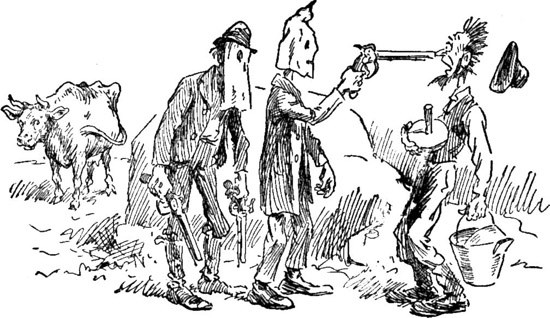
EXCEEDINGLY MORTIFYING TO THE CITIZEN WHO WENT TO MILK WITHOUT HIS GUN.
Two ports of entry were now opened to us in Japan by Commodore Perry's Expedition, and cups and saucers began to be more plentiful in this country, many of the wealthier deciding at that time not to cool tea in the saucer or drink it vociferously from that vessel. This custom and the Whig party passed away at the same time.
The Republican or Anti-Slavery party nominated for President John C. Frémont, who received the vote of eleven States, but James Buchanan was elected, and proved to the satisfaction of the world that there is nothing to prevent any unemployed man's applying for the Presidency of the United States; also that if his life has been free from ideas and opinions he may be elected sometimes where one who has been caught in the very act of thinking, and had it proved on him, might be defeated.
Chief Justice Taney now stated that slaves could be taken into any State of the Union by their owners without forfeiting the rights of ownership. This was called the Dred Scott decision, and did much to irritate Abolitionists like John Brown, whose soul as this book goes to press is said to be marching on. Brown was a Kansas man with a mission and massive whiskers. He would be called now a crank; but his action in seizing a United States arsenal at Harper's Ferry and declaring the slaves free was regarded by the South as thoroughly representative of the Northern feeling.
The country now began to be in a state of restlessness. Brown had been captured and hanged as a traitor. Northern men were obliged to leave their work every little while to catch a negro, crate him, and return him to his master or give him a lift towards Canada; and, as the negro was replenishing the earth at an astonishing rate, general alarm broke out.
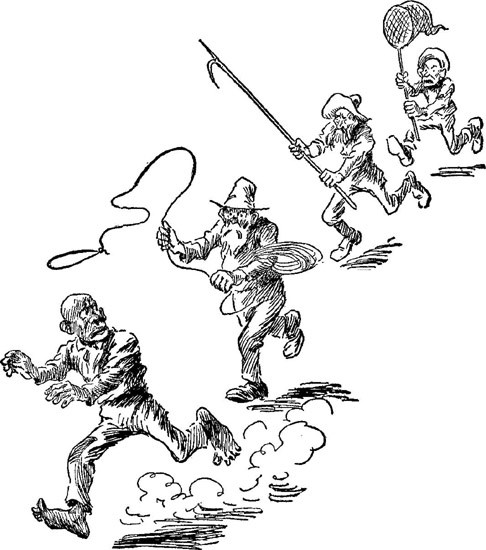
OBLIGED TO LEAVE THEIR WORK EVERY LITTLE WHILE TO CATCH A NEGRO.
Douglas was the champion of squatter sovereignty, John C. Breckinridge of the doctrine that slaves could be checked through as personal baggage into any State of the Union, and Lincoln of the anti-slavery principle which afterwards constituted the spinal column of the Federal Government as opposed to the Confederacy of the seceded States.
Lincoln was elected, which reminded him of an anecdote. Douglas and several other candidates were defeated, which did not remind them of anything.
South Carolina seceded in December, 1860, and soon after Mississippi, Florida, Alabama, Georgia, Louisiana, and Texas followed suit.
The following February the Confederacy was organized at Montgomery, Alabama, and Jefferson Davis was elected President. Long and patient effort on the part of the historian to ascertain how he liked it has been entirely barren of results. Alexander H. Stephens was made Vice-President.
Everything belonging to the United States and not thoroughly fastened down was carried away by the Confederacy, while President Buchanan looked the other way or wrote airy persiflage to tottering dynasties which slyly among themselves characterized him as a neat and cleanly old lady.
Had Buchanan been a married man it is generally believed now that his wife would have prevented the war. Then she would have called James out from under the bed and allowed him to come to the table for his meals with the family. But he was not married, and the war came on.
Major Anderson was afraid to remain at Fort Moultrie in Charleston Harbor, so crossed over to Fort Sumter. The South regarded this as hostility, and the fort was watched to see if any one should attempt to divide his lunch with the garrison, which it was declared would be regarded as an act of defiance. The reader will see by this that a deaf and dumb asylum in Northern Michigan was about the only safe place for a peaceable man at that time.
President Lincoln found himself placed at the head of a looted government on the sharp edge of a crisis that had not been properly upholstered. The Buchanan cabinet had left little except a burglar's tool or two here and there to mark its operations, and, with the aged and infirm General Scott at the head of a little army, and no encouragement except from the Abolitionists, many of whom had never seen a colored man outside of a minstrel performance, the President stole incog. into Washington, like a man who had agreed to lecture there.
Southern officers resigned daily from the army and navy to go home and join the fortunes of their several States. Meantime, the Federal government moved about like a baby elephant loaded with shot, while the new Confederacy got men, money, arms, and munitions of war from every conceivable point.
Finding that supplies were to be sent to Major Anderson, General Peter G. T. Beauregard summoned Major Anderson to surrender. General Beauregard, after the war, became one of the good, kind gentlemen who annually stated over their signatures that they had examined the Louisiana State Lottery and that there was no deception about it. The Lottery felt grateful for this, and said that the general should never want while it had a roof of its own.
Major Anderson had seventy men, while General Beauregard had seven thousand. After a bombardment and a general fight of thirty-four hours, the starved and suffocated garrison yielded to overwhelming numbers.
President Lincoln was not admired by a class of people in the North and South who heard with horror that he had at one time worked for ten dollars a month. They thought the President's salary too much for him, and feared that he would buy watermelons with it. They also feared that some day he might tell a funny story in the presence of Queen Victoria. The snobocracy could hardly sleep nights for fear that Lincoln at a state dinner might put sugar and cream in his cold consommé.
Jefferson Davis, it was said, knew more of etiquette in a minute than Lincoln knew all his life.
The capture of Sumter united the North and unified the South. It made "war Democrats"—i.e., Democrats who had voted against Lincoln—join him in the prosecution of the war. More United States property was cheerfully appropriated by the Confederacy, which showed that it was alive and kicking from the very first minute it was born.
Confederate troops were sent into Virginia and threatened the Capitol at Washington, and would have taken it if the city had not, in summer, been regarded as unhealthful.
The Sixth Massachusetts Regiment, hurrying to the capital, was attacked in Baltimore and several men were killed. This was the first actual bloodshed in the civil war which caused rivers and lakes and torrents of the best blood of North and South to cover the fair, sweet clover fields and blue-grass meadows made alone for peace.
The general opinion of the author, thirty-five years afterwards, is that the war was as unavoidable as the deluge, and as idiotic in its incipiency as Adam's justly celebrated defence in the great "Apple Sass Case."
Men will fight until it is educated out of them, just as they will no doubt retain rudimentary tails and live in trees till they know better. It's all owing to how a man was brought up.
Of course after we have been drawn into the fight and been fined and sent home, we like to maintain that we were fighting for our home, or liberty, or the flag, or something of the kind. We hate to admit that, as a nation, we fought and paid for it afterwards with our family's bread-money just because we were irritated. That's natural; but most great wars are arranged by people who stay at home and sell groceries to the widow and orphan and old maids at one hundred per cent. advance.
Arlington Heights and Alexandria were now seized and occupied by the Union troops for the protection of Washington, and mosquito-wires were put up in the Capitol windows to keep the largest of the rebels from coming in and biting Congress.
Fort Monroe was garrisoned by a force under General Benjamin F. Butler, and an expedition was sent out against Big Bethel. On the way the Federal troops fired into each other, which pleased the Confederates very much indeed. The Union troops were repulsed with loss, and went back to the fort, where they stated that they were disappointed in the war.
West Virginia was strongly for the Union in sentiment, and was set off from the original State of Virginia, and, after some fighting the first year of the war over its territory, came into line with the Northern States. The fighting here was not severe. Generals McClellan and Rosecrans (Union) and Lee (Confederate) were the principal commanders.
The first year of the war was largely spent in sparring for wind, as one very able authority has it.
In the next chapter reference will be made to the battle of Bull Run, and the odium will be placed where it belongs. The author reluctantly closes this chapter in order to go out and get some odium for that purpose.
CHAPTER XXV.
BULL RUN AND OTHER BATTLES
On the 21st of July, 1861, occurred the battle of Bull Run, under the joint management of General Irwin McDowell and General P. G. T. Beauregard. After a sharp conflict, the Confederates were repulsed, but rallied again under General T. J. Jackson, called thereafter Stonewall Jackson. While the Federals were striving to beat Jackson back, troops under Generals Early and Kirby Smith from Manassas Junction were hurled against their flank.5 McDowell's men retreated, and as they reached the bridge a shell burst among their crowded and chaotic numbers. A caisson was upset, and a panic ensued, many of the troops continuing at a swift canter till they reached the Capitol, where they could call on the sergeant-at-arms to preserve order.

